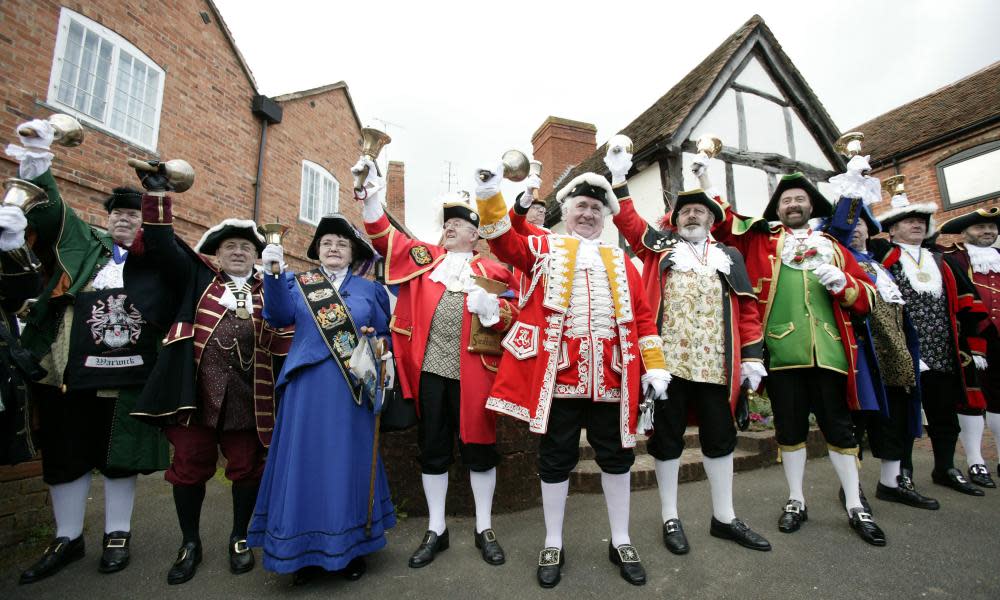British Town Crier Championships to be held in silence due to Covid

Town criers come in all shapes and sizes, but you may expect the possession of a powerful set of lungs to be a prerequisite for anyone hoping to be crowned National Champion. Oyez? In a new Covid-conscious world, the answer is rather: oh no.
For the first time in its history, this year the British Town Crier Championships are to be held in perfect silence, with the country’s traditional news-bearers to be judged on the quality of their written cries alone.
While judges are usually focused on “three distinct parts of a cry” – sustained volume and clarity, diction and inflection, and content – this year they will focus on whether cries have stuck to the theme and the 140-word limit, says organiser and champion crier Carole Williams.
“It’s got to be interesting enough to hold its audience, it needs a certain rhythm. And it must stick to the word count,” says Williams, Bishop’s Stortford’s town crier since 1996. “That has to include three Oyezs at the beginning and God Save the Queen at the end, of course.”
The theme for this year’s competition, organised by The Loyal Company of Town Criers, is “nature and the environment” in support of mental health week 10-16 May. Judges for the 2021 championships include poet Ian McMillan, known as the Bard of Barnsley, as well as an international public speaker and an English teacher, with the winner announced on 13 May.
All funds raised by the competition will go to the charity Shout, which provides mental health support via a text message, but the competition is also a way for notoriously sociable town criers – who may take part in half a dozen competitions around the country every year – to stay connected, she says.
“We love an audience and at the moment we haven’t got one – it’s a big chunk missing from town criers’ lives,” she says. Anyway, keeping the competition going in the face of adversity is a very town crier thing to do: “We carry on regardless, keep calm and carry on. This is what we do.”
Watch: Coronavirus peaks examined across the UK
For her partner, reigning British Town Crier champion Paul Gough (“People always ask if it’s very noisy in our house,” says Williams, “But actually, it’s really very quiet. Because when your voice is an instrument, you don’t abuse it.”), the joy of town crying is in its history.
“Depending on who you talk to, you could say the first to do our particular calling were the prophets in the Bible,” says the Nuneaton & Bedworth crier, who met Williams at the millennium town crier competition in Ghent, Belgium.
“Following on from that were the heralds of ancient Greece and Rome – they used to announce in the news, and presumably sports events like, you know, Lions – 15 Christians – Nil.”
According to The Loyal Company of Town Criers website the role dates back to at least the Norman invasion, with two bellmen appearing in the Bayeux tapestry. Town criers were employed to tell townspeople the latest news, proclamations and bylaws, grabbing their attention by ringing a handbell. The traditional cry “Oyez!”, comes from the French to listen and means “Hear ye”, while criers will always end with the proclamation: “God save the Queen!”
That long history has not survived without a little innovation, says Jane Smith, secretary of the Ancient and Honourable Guild of Town Criers. Indeed the silent town crying competition is not the only way the community has made itself heard in the last year – in June, Wareham town crier Jacquie Hall hosted the first “virtual” competition, attracting competitors from destinations as far-flung as Australia.
“It was quite interesting,” says Smith, town crier for Bognor Regis. “When you actually did your cry, obviously, we were all sitting wherever we were. It’s kind of weird shouting at your computer in the garden.”
While the last year has been quiet, Smith reckons town criers could play an emotionally poignant role this year – if they are employed by their towns to announce the end of all lockdown restrictions. “I think that is going to happen,” she says. “There’s going to be lots of shouting and ringing bells going off – don’t you worry about that.”
Watch: How do people feel about the AstraZeneca vaccine?

 Yahoo Movies
Yahoo Movies 
